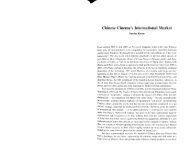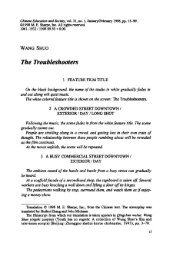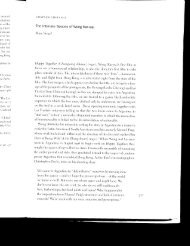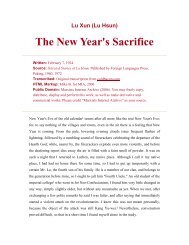Popular Cinema and Political Thought in Post-Mao China
Popular Cinema and Political Thought in Post-Mao China
Popular Cinema and Political Thought in Post-Mao China
Create successful ePaper yourself
Turn your PDF publications into a flip-book with our unique Google optimized e-Paper software.
uf G. Pickowiczailv <strong>and</strong> otherd ~f Tianyunonly a partialweighty issuesResolution onund<strong>in</strong>g of the21Those whoeful as NikitaFebruary 1956ement receivedon balance, itthe post-1949han the highlynd of Tianyuny love <strong>and</strong> Atrmed Ch<strong>in</strong>eseer years" <strong>and</strong>,<strong>Mao</strong>. Thoughrul<strong>in</strong>g elite tobility, it hardlyfundamentalarkably upbeat.eriod from theshment of the<strong>and</strong> the partyd, even moree characterizedng our countrythat there were· 1955, that theoad," <strong>and</strong> thatorward, but no<strong>in</strong> the massive> decade of the;ocial, political,e, <strong>in</strong> the ma<strong>in</strong>,nach<strong>in</strong>ations ofV1ao <strong>in</strong> his laterad been turnedemlution when1cialist modernneeof the firstJuly resolution<strong>Popular</strong> <strong>C<strong>in</strong>ema</strong> <strong>and</strong> <strong>Political</strong> <strong>Thought</strong> 45stated <strong>in</strong> no uncerta<strong>in</strong> terms that the Central Committee's criticisms of <strong>Mao</strong><strong>and</strong> the Cultural Revolution reaffirmed, rather than questioned, the "fourcard<strong>in</strong>al pr<strong>in</strong>ciples": the correctness of the socialist road, the proletari<strong>and</strong>ictatorship, the leadership of the Communist party, <strong>and</strong> the ideologicalhegemony of Marxism-Len<strong>in</strong>ism <strong>and</strong> <strong>Mao</strong> Zedong <strong>Thought</strong>. In no case, theresolution warned, should the party's mistakes be used as a "pretext forweaken<strong>in</strong>g, break<strong>in</strong>g away from or even sabotag<strong>in</strong>g its leadership. It isimperative," the Central Committee added, "to ma<strong>in</strong>ta<strong>in</strong> a high level ofvigilance <strong>and</strong> conduct effective struggle aga<strong>in</strong>st all those who are hostile tosocialism <strong>and</strong> try to sabotage it <strong>in</strong> the political, economic, ideological <strong>and</strong>cultural fields."The basic social views expressed <strong>in</strong> the three films under review, it seemssafe to say, were significantly more critical than the ones conta<strong>in</strong>ed <strong>in</strong> thisextraord<strong>in</strong>ary benchmark resolution. The fact that these same films werehighly acclaimed by many film professionals <strong>and</strong> young urban film fans tellsus someth<strong>in</strong>g about the gap between the official pronouncements of theparty <strong>and</strong> popular political thought <strong>in</strong> the early 1980s. Of course, I do notmean to suggest that the <strong>in</strong>terests <strong>and</strong> thought of elite filmmakers wereidentical to the thought of the ord<strong>in</strong>ary people who frequent movie houses,or to deny that, <strong>in</strong> structural terms, films <strong>and</strong> filmmakers belonged to theofficial realm. It seems to me, however, that the popularity of these filmscan be expla<strong>in</strong>ed, <strong>in</strong> part, by the audience's obvious approval of the basicsocial views espoused. The mak<strong>in</strong>g of serious political melodramas <strong>in</strong> theearly 1980s was not simply a matter of a few elite filmmakers suddenly <strong>and</strong><strong>in</strong>explicably embrac<strong>in</strong>g the unofficial <strong>and</strong> popular political views of urbanyouth. Nor was it a matter of renegade cultural elites patroniz<strong>in</strong>g <strong>and</strong> agitat<strong>in</strong>gamong an apolitical <strong>and</strong> <strong>in</strong>articulate urban mass. The process of politicalfertilization, I strongly suspect, was from both the top down <strong>and</strong> the bottomup. A central paradox of early 1980s Ch<strong>in</strong>ese filmmak<strong>in</strong>g is that the seriouspolitical films were popular cultural artifacts produced by privileged filmmakerswho were able to work outside the ma<strong>in</strong>stream of official ideology.Their state-funded work was unofficial <strong>in</strong> the sense that it represented m<strong>in</strong>orityor dissent<strong>in</strong>g political positions held by <strong>in</strong>fluential elites, <strong>in</strong>clud<strong>in</strong>g partymembers. More importantly, at least for our purposes, their work was unofficial<strong>and</strong> popular <strong>in</strong> the sense that it actively sought to represent the politicalviews of ord<strong>in</strong>ary people who felt that party reform policies were <strong>in</strong>adequate.The fact that educated elites produced this work <strong>and</strong> that the state, <strong>in</strong> asense, allowed this activity to take place does not mean that these filmscannot be considered as expressions of popular political thought.At the level of raw political analysis The legend of Tianyun Mounta<strong>in</strong>was considerably more provocative than the July 1981 resolution, go<strong>in</strong>g farbeyond the scope of the well-received "scar literature" (shanghcng wenxue)produced immediately follow<strong>in</strong>g the Cultural Revolution. Whereas most scarliterature dwelled on the abuses people suffered dur<strong>in</strong>g the Cultural Revolution<strong>and</strong> heaped blame on the Gang of Four for the sorry condition of Ch<strong>in</strong>a<strong>in</strong> the late 1970s, The legend of Tianyun Mounta<strong>in</strong> said almost noth<strong>in</strong>g






